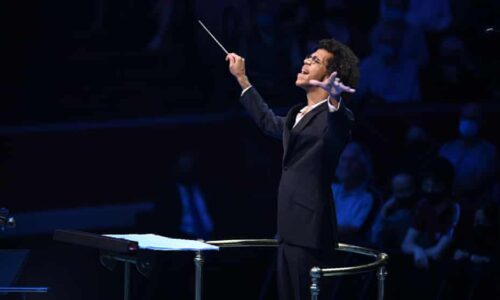 United Kingdom Ravel, Mahler: Ana Quintans (soprano), Julien Van Mellaerts (baritone), Scottish Chamber Orchestra / Jonathon Heyward (conductor). Queen’s Hall, Edinburgh, 9.12.2021. (SRT)
United Kingdom Ravel, Mahler: Ana Quintans (soprano), Julien Van Mellaerts (baritone), Scottish Chamber Orchestra / Jonathon Heyward (conductor). Queen’s Hall, Edinburgh, 9.12.2021. (SRT)

Ravel – Ma mère l’Oye
Mahler – Des Knaben Wunderhorn
I went into this concert really excited by the concept behind it: Ravel’s Mother Goose suite interspersed with songs from Mahler’s Des Knaben Wunderhorn. I love these artistic syntheses, when works of art are placed next to one another and, thus, speak across, revealing things about one another. When they work, I find them exhilarating, be it in literature, the visual arts or music. Sir Simon Rattle is the master of finding an enlightening pairing of orchestral works, and I wish more conductors (and soloists) would do it.
It is difficult to get right, though, and I was a bit underwhelmed by the results of this pairing. Put simply, I can’t say I found anything particularly striking about the choice. The songs and the movements from Mother Goose seemed put together in a slightly random patchwork that didn’t strike me as revelatory, and certainly never made me think of cross-fertilisation in ways that I had hoped. Sometimes, in fact, it seemed actively perverse: beginning the Mahler selection with Das himmlische Leben, for example, dropped us at the end of the Fourth Symphony without having undergone any of the listening journey we normally undertake to get there, and the final two symphonic movements (Es sungen drei Engel and Urlicht) weren’t well matched, not helped by the fact that both were transposed.
Maybe the problem is intrinsic to these two works. It is not as if Mahler wrote the Wunderhorn songs as a set, after all: he composed them piecemeal over several years, writing some for piano, some for orchestra, and some as movements of his symphonies. Hearing them in any sort of collection is intrinsically random, so I suppose that interspersing them with Ravel was never going to clarify things.
Consumed as a confection, however, the evening was, in many parts, very successful, principally from the orchestra. The Scottish Chamber Orchestra is the ideal size for Ravel. The exquisite gorgeousness of his sound world becomes even more apparent when they play it, bringing more transparency in a way that seems to bring the music closer to the ear. The orientalism of Laideronette positively shimmered, while the radiant Fairy Garden unfurled like an opening flower, redolent with fresh innocence as much as with magic. They also pinpointed some lovely details in the Mahler, particularly the wind flourishes in Das himmlische Leben which I had never really noticed before.
The singers were good, too. Ana Quintans’s soprano was fresh and lovely, never forced. She sang with a sly wink in Rheinlegendchen and Wer hat dies Liedlein erdacht? but deep, poignant seriousness in Wo die schönen Trompeten blasen, perhaps the finest of all the songs when taken alongside the orchestra’s understated accompaniment. Julien Van Mellaerts’s is a lighter voice than you would normally associate with Mahler, and he didn’t quite get into the darkness of songs like Revelge or Der Tamboursg’sell, but he was a compelling vocal actor, and he was at his freshest in Es sungen drei Engel, not normally a song that a baritone gets anywhere near.
Most interesting of all, however, was conductor Jonathon Heyward, making his SCO debut. His podium gestures are curt but clear, and he is very engaging to watch. More importantly, his line of musical argument was never less than convincing, often much more than that. It is all the more impressive because he was a late stand-in for another conductor, so he clearly inherited somebody else’s programme, yet he did his best to make it his own. The orchestra responded to him really well, pivoting on a knife edge with some of Mahler’s emotional contrasts, and suggesting that this is a relationship that might go somewhere. It has clearly got off to a good beginning. I would like to hear them together again.
Simon Thompson
